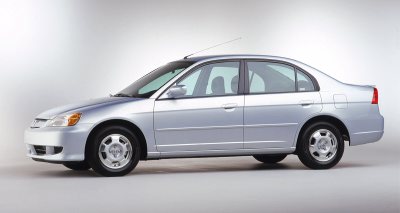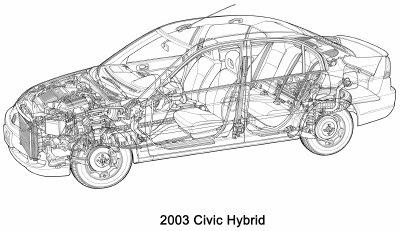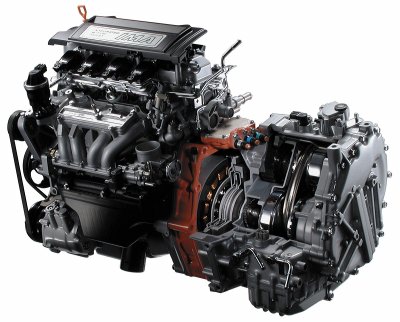2003 Car Review: Honda Civic Hybrid
 |
 |
 |
SEE ALSO: Honda Buyer's Guide
By Des Toups
Base price: $19,550
Price as tested: $20,010
EPA mileage: 46 city/51 highway
Forget for now that, as a car, the Honda Civic Hybrid is zero fun, slow and frail-feeling. If you wanted fun, you’d get a garden-variety Civic, which is zippy and solid and about $4,000 cheaper. No, there are two reasons to buy a Hybrid, or any hybrid, for that matter: You want to save money on gasoline, or you want to drive guilt-free.
The Civic Hybrid, like its sole competitor, the Toyota Prius, uses a battery pack to boost the power of a tiny, gas-sipping gasoline engine. Energy produced when you brake or slow the car recharges the batteries. Both shut the gasoline engine down completely when it’s not needed; for the Civic Hybrid, that’s at stoplights; for the Prius, that’s at low speeds where electricity provides sufficient power. The result, provided you drive in a way that takes advantage of the technology, is real-world mileage that approaches 50 mpg.
Getting the best mileage out of a 5-speed manual Civic Hybrid (it’s also available in an automatic) requires a learning curve of a week or two. The idea is to let the batteries, whose power is essentially free, do as much of the heavy lifting as possible.
The Civic Hybrid helps out with a light that reminds the driver to upshift as soon as possible and a gauge indicating whether the car is using the batteries or recharging them. Shifting early makes the tiny, 1.3-liter four-cylinder lug lumpily (causing everything from loose change to sun visors to rattle) then begins to tap the battery power. It’s unnerving at first, then invisible once shifting so early becomes a habit. Driven this way, mileage very near the EPA estimate of 46 city is possible.
But it takes little to bring that number down, such as accelerating with any kind of urgency, or turning off the air-conditioner’s "econ" mode, which prevents ventilation from shutting down when the engine does. Our tester, driven gingerly, achieved 42 mpg.
That’s a great number by any standard. The question is whether the Hybrid extracts too much in return for it.
The Hybrid can, in fact, be whipped to stay with the cut and thrust of traffic -- but you’ll give up any hope of mileage over 40 once you dive into the passing lane. Any real sense of forward progress comes in third gear or lower, foot to the floor, as you watch the real-time gas mileage gauge dip into the teens and 20s.
But the Hybrid isn't just slow. The power steering, for example, is electric -- normal power steering would cut off when the engine does -- and devoid of any feel. The Hybrid’s steering doesn’t center naturally, letting the car wander if the driver’s attention does. But the Hybrid is reasonably stable on the Interstate, far less prone to crosswinds and other distractions than the minuscule, two-seat Insight, Honda’s other hybrid vehicle.
There seems little rhyme or reason behind the auto-stop feature, which is supposed to shut off the engine when the car is completely stopped and the gearshift is in neutral, as at a stoplight. Ours cut off disconcertingly in low-speed corners, with the clutch engaged and the car in gear, and sometimes when trundling up to a stop. The cutoff also makes stop-and-go traffic a little dicey on hills.
Hard, narrow tires, chosen for their lack of rolling resistance, mounted on 14-inch rims transmit less commotion than you’d think; in fact, the Hybrid is a relaxed cruiser, notably quieter than other small sedans. The tires grip fine but howl even at low speeds. At best, this is a competent-handling car, not a joyful one.
But no one will buy a Civic Hybrid for its handling. They’re ponying up an extra $4,000 or so for gas mileage -- but that’s money they’ll never get back, at least until gasoline hits $2.50 a gallon or so. A similarly equipped, garden-variety Civic LX sedan sells for about $16,500 and returns 31 mpg in the city, 38 on the highway. Using the city mileage figure (which most people would achieve in day-in, day-out driving), you’d spend $725 a year to drive 15,000 miles on $1.50 gasoline. The Civic Hybrid would consume $469 worth, a savings of just $256 a year. A one-time, $2,000 tax deduction, worth about $770 to someone in the top tax brackets, tips the balance a little, and so do little perks like free parking and sales-tax exemptions in some states. Still, you shouldn’t buy a Hybrid just to save money.
Or to save the environment. The Hybrid is an Ultra-Low Emissions Vehicle, cleaner than most, but not as clean as many other fuel-misers. The EPA’s "Green Vehicle Guide" assigns the Hybrid a ranking of 7 on a 1-10 scale, below not only the Nissan Sentra CA and Toyota Prius but also beneath gasoline versions of the Civic itself.
Honda has done its best to make the Hybrid attractive as a car, not just as a political statement, adding such frills as climate control, a (very tinny sounding) CD player, antilock brakes and alloy wheels. Still, for its $20,010 price tag, the Hybrid offers precious little to recommend it over a more comfortable, peppier, cheaper, almost-as-economical Civic LX.
Des Toups is a Seattle free-lance writer whose work has appeared in AutoWorld magazine, The Seattle Times and newspapers nationwide.


